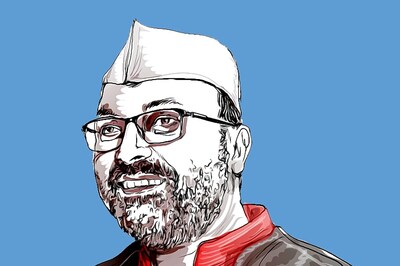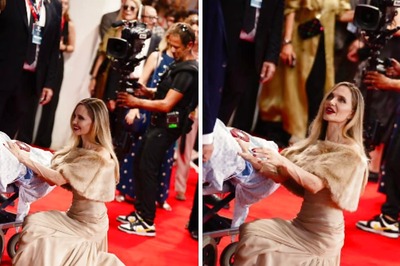
views
New York: An assistant museum curator who questioned the authenticity of a Leonardo da Vinci has been murdered - but before he died he left a code in his appointment calendar and a cryptic trail of clues connected to secrets in works of art that point to the killer.
Now, would-be gumshoes must figure out what drove one of four suspects to kill him. Was it greed? Fame? Lust? Or revenge?
That's the plot of Murder at the Met, a murder-mystery scavenger hunt at the Metropolitan Museum of Art in New York run by Watson Adventures, a private company offering a series of such games at 27 museums in seven U.S. cities.
On a recent Saturday, 40 people gathered in a basement room of the museum for the "whodunnit" challenge. Divided into 10 teams, they received 22 questions linked to 22 works of art, directions to specific galleries and a map. They were told that the curator's notes contained blanks and underlined words. Their assignment: Find the works, fill in the blanks and figure out what the underlined words refer to.
Each team then headed in a different direction, crisscrossing dozens of galleries in an exhilarating and competitive two-hour hunt. (Hint: Read the wall labels to make sure you're in the right place and looking at the right piece).
The winning team correctly answered the most questions, determined the motive and decoded a set of corresponding numbers that exposed the murderer's name.
The suspects were the chief curator who was about to announce the acquisition of the rare Leonardo; a multi-millionaire who put up a big chunk of the purchase money; the dead curator's wife and an art dealer who specialized in Old Master paintings.
(Sorry, no spoiler alerts here. Watson Adventures refused to allow a reporter on the hunt to keep a set of questions and answers to the mystery - and extracted a promise from her not to reveal the killer's name.)
"I really like the level of difficulty," said Matt Fuhrman, 22, a college graduate from Columbus, Ohio, who took part in the Met hunt. "I read the Da Vinci Code and all the Dan Brown books. It was very much like the books." His team discovered a message inscribed on the back of a sculpture of the ancient Greek poet Sappho.
Founder Bret Watson said the company grew from his love of art, history and writing and a fascination for finding funny and bizarre details in works of art - like a figure of a saint in a stained-glass window in the museum's Medieval gallery who's a dead ringer for Mick Jagger and whose name is St. Roch (pronounced like the stone). The scavenger hunt question for that work is: "Which stained-glass pane looks like he `Can't get no satisfaction?' "
The hunt involving the murdered curator is tailored to a museum's collection and is also offered at The Museum of Fine Arts in Boston, The Art Institute of Chicago, The Getty Center in Los Angeles, The Philadelphia Museum of Art and The National Gallery of Art in Washington, D.C. The method for cracking the code is different at each.
Other Watson Adventures hunts include "Naked at the (fill in museum name)." (And no, participants don't run around naked but they do track down works of art that include randy Romans, peeping Toms, bathing beauties, sultry sirens and even a god with Venus envy). These are pun-based, requiring participants to solve devious and humorous questions.
Fuhrman's friends, Christine D'Amore, 20, of Miami, and Megan Moran, 21, of Port St. Lucie, Fla., said the hunt opened their eyes to new areas of the museum.
"I've been here over five times, and there were places I've never been to before, rooms that I loved (like) the Egyptian tombs that I never noticed before," said D'Amore.
Moran said she liked that the scavenger hunt focuses on lesser known works.
"It's really great to see the intricacies of the art that doesn't get the big advertisement," she said.
The hunts are a way of getting people to "discover stuff they wouldn't normally see because they fall into habits and tend to go toward the biggest hits," said Watson, a former magazine writer and editor who creates 80 percent of the mystery hunts himself.
The groups receive specific directions, like `look for the lion, turn left, turn into the room where there's a royal bed," said Watson. "Sometimes I'll make a group go through a room just so they can see it. My hope is that people get excited and after the hunt, go back to parts of the museum they were intrigued by."
David Filipiak, the Met's tourism marketing manager, said Watson Adventures ties in nicely with the museum's campaign to "Get Close" to the art.
"When you look at art, it can change you - not just wander, stroll by, but truly take the time to look at the details, it can be a changing experience," he said.
In 2010, Watson Adventures said it brought 3,878 people to the Met, and 1,943 during the first six months of this year. That year, 4.9 million people visited the museum, the Met said.
The hunts, averaging $35, do not require any knowledge of art and are held on select weekends each month. A pair of comfortable shoes is advisable.
A recent - and timely addition - is The Wizard School Scavenger Hunt, designed for Harry Potter lovers. The company describes it as a way for wizards and muggles alike to enjoy searching for art reminiscent of the Hogwarts School of Witchcraft and creatures as scary as the Death Eaters and Dementors.
Watson Adventures also offers scavenger hunts in historic locations, like Salem, Mass., famous for its 17th-century witch trials, and New York's Greenwich Village, a mecca for artists and innovators and the home of the Stonewall Inn, which became a rallying point for gay rights in June 1969.
Loring Allen, 49, a marketing executive from Rye, N.Y., said the Watson Adventures hunts are so challenging and fun that she's done five, including "Naked at the Met" that a friend booked for a group of friends in town for her wedding.
"She did it as a way to entertain people ... and have them get to know each other," Allen said. "And then I had people to talk to at the wedding."


















Comments
0 comment